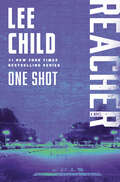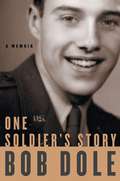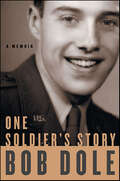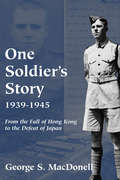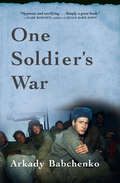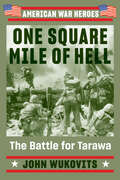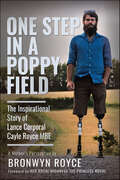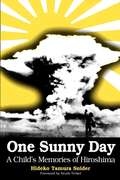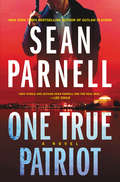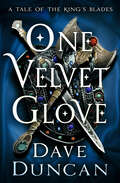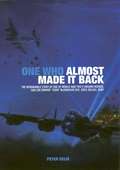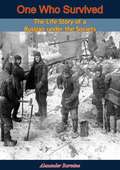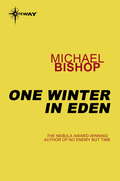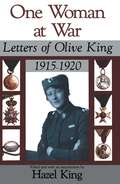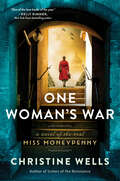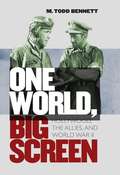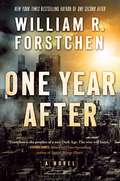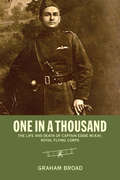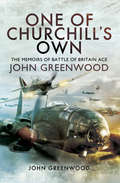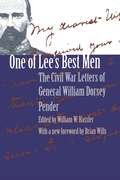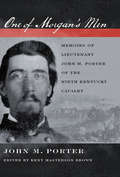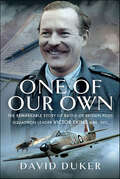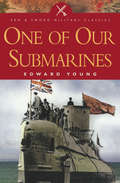- Table View
- List View
One Shot: A Reacher novel (Jack Reacher #9)
by Lee Child#1 NEW YORK TIMES BESTSELLER • Don&’t miss the hit streaming series Reacher! &“Pure, escapist gold . . . Mr. Child&’s tough talk and thoughtful plotting make an ingenious combination.&”—The New York TimesSix shots. Five dead. One heartland city thrown into a state of terror. But within hours the cops have it solved: a slam-dunk case. Except for one thing. The accused man says: You got the wrong guy. Then he says: Get Reacher for me. And sure enough, ex—military investigator Jack Reacher is coming. He knows this shooter–a trained military sniper who never should have missed a shot. Reacher is certain something is not right–and soon the slam-dunk case explodes. Now Reacher is teamed with a beautiful young defense lawyer, moving closer to the unseen enemy who is pulling the strings. Reacher knows that no two opponents are created equal. This one has come to the heartland from his own kind of hell. And Reacher knows that the only way to take him down is to match his ruthlessness and cunning–and then beat him shot for shot.
One Soldier's Story: A Memoir
by Bob DoleA memoir detailing Bob Dole's entry into the army and his time serving before a German shell blast damages his spine and shoulder. His three years of recovery are detailed here.
One Soldier's Story: A Memoir
by Sen. Bob Dole“A poignant and inspiring memoir. . . . Dole’s odyssey of courage and determination can be a guideline to us all.”— Philadelphia InquirerIn his own words, Bob Dole tells his legendary World War II story—a personal odyssey of tremendous courage, sacrifice, and faithIn One Soldier’s Story, Dole recites the moving, inspirational story of his harrowing experience in World War II, and how he overcame life-threatening injuries long before rising to the top of the U.S. Senate. As a platoon leader in the famed 10th Mountain Division, 21-year-old Bob Dole was gravely wounded on a hill in the Italian Alps just two weeks before the end of the war. Trying to pull his radioman to safety during a fire-fight against a fortified German position, Dole was hit with shrapnel across his right shoulder and back. Over the next three years, not expected to survive, he lapsed in and out of a coma, lost a kidney, lost the use of his right arm and most of the feeling in his left arm. But he willed himself to live.Drawing on nearly 300 never-before-seen letters between him and his family during this period, Dole offers a powerful, vivid portrait of one man’s struggle to survive in the closing moments of the war. With insight and candor, Dole also focuses on the words, actions, and selfless deeds of countless American heroes with whom he served, including two fellow injured soldiers who later joined him in the Senate, capturing the singular qualities of his generation. He speaks here not as a politician, but as a wounded G.I. who went on to become one of our nation’s most respected statesmen. In doing so, he gives us a heartfelt story of uncommon bravery and personal faith-in himself, his fellow man, and a greater power.
One Soldier's Story: From the Fall of Hong Kong to the Defeat of Japan
by George S. MacdonellThis is the story of a seventeen year old boy who ran away from home to join the Canadian Army at the outbreak of the Second World War in 1939. It describes the fateful adventures of two regiments dispatched to the Pacific to face the Japanese, and the courage of two thousand young soldiers who, when faced with an impossible task thousands of miles from home, behaved with honour and distinction. Though they lost the battle of Hong Kong, they succeeded in showing the world the mettle of which they were made.
One Soldier's War
by Arkady Babchenko““One Soldier’s War” is a visceral and unflinching memoir of a young Russian soldier’s experience in the Chechen wars that brilliantly captures the fear, drudgery, chaos, and brutality of modern combat. An excerpt of the book was hailed by Tibor Fisher in the “Guardian” as right up there with “Catch-22” and Michael Herr’s “Dispatches”,” and the book won Russia’s inaugural Debut Prize, which recognizes authors who write despite, not because of, their life circumstances.” In 1995, Arkady Babchenko was an eighteen-year-old law student in Moscow when he was drafted into the Russian army and sent to Chechnya. It was the beginning of a torturous journey from naïve conscript to hardened soldier that took Babchenko from the front lines of the first Chechen War in 1995 to the second in 1999. He fought in major cities and tiny hamlets, from the bombed-out streets of Grozny to anonymous mountain villages. Babchenko takes the raw and mundane realities of war the constant cold, hunger, exhaustion, filth, and terror and twists it into compelling, haunting, and eerily elegant prose. Acclaimed by reviewers around the world, this is a devastating first-person account of war by an extraordinary storyteller.
One Square Mile of Hell: The Battle for Tarawa (American War Heroes)
by John WukovitsIn the Tarawa atoll lies the tiny islet of Betio. In November of 1943, the men of the 2nd Marine Division watched as bombardments destroyed the island's Japanese defenses. But when the Marines landed, the Japanese poured out of their protective bunkers and began one of the most brutal encounters of the war. Drawn from sources such as participants' letters and diaries and interviews with survivors, One Square Mile of Hell is the riveting true account of a battle between two determined foes, neither of whom would ever look at each other in the same way again. .
One Step in a Poppy Field: The Inspirational Story of Lance Corporal Cayle Royce MBE
by Bronwyn Royce‘A deeply moving and profoundly important account not only of one soldier’s survival, but of optimism, courage, of a dogged determination to succeed whatever it takes, and of the enduring power of love between a mother and her son. The lessons for us all in this book are immeasurably powerful. It offers hope to the many whose lives have been changed forever, directly or indirectly, be that as a result of war, or through accident. I am so very grateful to have read it.’ Major General David Rutherford-Jones CB ‘This is an astonishing true story that no work of fiction could ever match. A brave soldier is blown up by the Taliban, losing both legs, part of his left hand and his lungs are crushed. There is, seemingly, no hope of survival. Except that death hadn’t reckoned on the fortitude and resilience of Cayle Royce, underpinned by the all-embracing love and dedication of his remarkable mother Bronwyn. The book is told by both of them and might be the most moving and joyous account of determination against all odds you will ever read. A triumph of the Human Spirit.’ Alan Frame, Author ‘A story of fortitude and courage from the perspective of both a mother and son. From the depths of despair of a near death experience through to an amazing recovery with a row across the Atlantic as skipper of an all amputee crew of ex servicemen, four guys with three legs between them!’ Brigadier Chris Dick CBE Thousands of miles away from where her son was deployed, a powerful premonition is devastatingly confirmed by a knock on the door from two faceless strangers bearing the news that her son had stepped on an improvised explosive device in the poppy fields of Afghanistan. He had lost both of his legs and suffered multiple other injuries, including partial amputation of all the fingers of his left hand. For 48 days she stood at his bedside, praying and willing him to pull through. Not only did he survive against all odds, but in time he began to test the limits of his new capabilities and undertook the first of, what would prove to be, many physical challenges. Just 18 months after injury, and as part of a team of four servicemen, he rowed across the Atlantic Ocean for the first time. Told mostly from a mother’s perspective with contributions from Cayle, the genesis of the book was in the diary she kept while he was in a medically induced coma. It is the story of an extraordinarily brave man who has been through the agonies of rebuilding his life, with the encouragement of family and friends. This was never meant to be another book about war or Afghanistan; it is a message of how love and hope can overcome adversity. If even just one reader takes inspiration from this story then … mission accomplished.
One Sunny Day: A Child's Memories of Hiroshima
by Hideko Tamura SniderWhen she was eleven years old Hideko Tamura came home to Hiroshima from boarding-school. Two days later the U.S. dropped the atomic bomb. In chilling detail the author describes the blast and its aftermath. She recounts her long and painful recovery from the trauma, a journey that leads her to nursing and the care of cancer patients.
One True Patriot: A Novel
by Sean ParnellSpecial operative Eric Steele must stop a foreign assassin targeting top-tier U.S. military personnel and derail a strike aimed at the heart of America in this third electrifying military thriller from the New York Times bestselling author of All Out War, perfect for fans of Brad Thor, Vince Flynn, and Tom ClancyTwo months after taking down terrorist Aleksandr Zakayev, Eric Steele is back in action. Though he is completing his Alpha assignments with the same deadly efficiency as always, he has lingering questions about his missing father—and his own future in the Program.When Steele gets the alert that a fellow Alpha is in serious trouble, he rushes to Paris—only to arrive too late. Jonathan Raines, Stalker Six, is dead, the victim of a brutal attack. While on leave in the City of Light, Raines had met an attractive art historian who lured him into a trap. Before she vanished, the mysterious woman left a warning for anyone from the Alpha program who might follow her.One of the best and most effective warriors in the top-secret Program, Steele has been trained to take on enemies, and no threat will deter him from avenging a fallen brother. But the killer won’t be easy to find. The search takes Steele around the world, from France, to the Adriatic coast of Italy, to the outskirts of Aleppo, Syria, and to a top-secret prison in Russia— where, unexpectedly, he finds more clues about his father—before finally taking him back to the streets of Washington, D.C.No one is safe while the killer is on the loose, and the danger is heightened when Steele discovers intel that killing Alphas is just the beginning of a larger, more nefarious plot. The real target is much, much bigger—and it’s up to Steele to prevent catastrophe before he becomes the next elite warrior to fall.
One Velvet Glove (Tales of the King's Blades)
by Dave DuncanSwashbuckling adventure awaits four unemployed knights searching for treasure in this fantasy tale by the award-winning author of The Jaguar Knights. Sir Rhys, Sir Sharp, and Sir Trusty may be three of the world&’s greatest swordsmen, but that hasn&’t saved them from being let go from their positions as Royal Guards. All three are still young , and without a job or pension, they need to find some way of making money. Rhys&’s father, Sir Spender, is a great Blade hero listed in the Litany. He is also without a job and may have a solution for their predicament. A great treasure was lost more than thirty years ago, and Spender thinks he knows its location and suggests they find it. Of course, Spender is not the only one to remember the lost treasure. King Ambrose claims it as his own—and is ready to use all the manpower at his disposal to get his hands on it first . . . Praise for Dave Duncan &“Dave Duncan is one of the best writers in the fantasy world today. His writing is clear, vibrant, and full of energy. His action scenes are breathtaking, and his skill at characterization is excellent.&” —Writers Write&“Duncan is an exceedingly finished stylist and a master of world building and characterizations.&” —Booklist
One Who Almost Made It Back: The Remarkable Story of One of World War Two's Unsung Heroes, Sqn Ldr Edward 'Teddy' Blenkinsop, DFC, CDEG (Belge), RCAF
by Peter CelisThe little-known, real-life account of a Canadian hero&’s courage and loyalty in the face of Nazi Germany&’s greatest horrors during World War II. On the night of 27/28 April 1944, Teddy Blenkinsop and his crew were acting as deputy master bombers during a Pathfinder raid on Montzen in Belgium. After a successful attack, their Lancaster was shot down. Miraculously he survived to be protected by Belgian citizens before ending his days in Bergen Belsen concentration camp. Little was known of his exploits in between until Peter Celis, a Belgian air-force officer, began to research the story. What he uncovered is far more amazing than any fictional film could be. He found that Blenkinsop was not only an exceptional and gallant operational pilot, but that his loyalty, dedication and devotion were second to none and that his bravery and fearlessness led him to make the supreme sacrifice in the face of Nazi Germany. Written with pace and insight, this is an uplifting account of an outstanding young man who very nearly made it back home.
One Who Survived: The Life Story of a Russian under the Soviets
by Max Eastman Alexander BarmineAn astounding personal document and unique autobiography—the life story of a Russian now living in America who was once soldier, industrialist, and diplomat under the Red Star.
One Winter in Eden
by Michael BishopOne Winter in Eden contains the following tales:"One Winter in Eden""Seasons of Belief""Cold War Orphans""The Yukio Mishima Cultural Association of Kudzu Valley, Georgia""Out of the Mouths of Olympus""Patriots""Collaborating""Within the Walls of Tyre""The Monkey's Bride""Vernalfest Morning""Saving Face""The Quickening"
One Woman At War: Letters of Olive King 1915–1920
by Hazel King (Ed)Olive King was born in Sydney in 1885. She offered her services as an ambulance driver soon after war broke out in 1914. She joined a small private organization early in 1915 and went to Belgium. In May 1915 she joined the Scottish Women's Hospitals and her letters, until now unpublished, date from that time. She joined the Serbian Army in 1916 and subsequently rose to the rank of sergeant. Driving on hazardous roads to the Front and to the Adriatic coast, she was often in danger. She was awarded a Serbian silver medal for bravery, and later a gold medal. Her letters not only give a picture of daily life under wartime conditions and in the immediate post-war years. They also show how a woman of the time regarded herself and her place in society.
One Woman Show: A Novel
by Christine CoulsonA sly and stylish novel—remarkably told through museum wall labels—about a 20th-century woman who transforms herself from a precious object into an unforgettable protagonist.Author Christine Coulson spent twenty-five years writing for the Metropolitan Museum of Art. Her final project was to write wall labels for the museum&’s new British Galleries. During that time, she dreamt of using The Met&’s strict label format to describe people as intricate works of art. The result is this bullet of a novel that imagines a privileged twentieth-century woman as an artifact—an object prized, collected, and critiqued. One Woman Show revolves around the life of Kitty Whitaker as she is defined by her potential for display and moved from collection to collection through multiple marriages. Coulson precisely distills each stage of this sprawling life, every brief snapshot in time a wry reflection on womanhood, ownership, value, and power. Described with poignancy and humor over the course of a century, Kitty emerges as an eccentric heroine who disrupts her porcelain life with both major force and minor transgressions. As human foibles propel each delicately crafted text, Coulson&’s playful reversal on our interaction with art ultimately questions who really gets to tell our stories.
One Woman's War: A Novel of the Real Miss Moneypenny
by Christine WellsONE OF BOOKBUB'S BEST HISTORICAL FICTION BOOKS OF THE FALLFrom the author of Sisters of the Resistance comes the story of WWII British Naval Intelligence officer Victoire Bennett, the real-life inspiration for the James Bond character Miss Moneypenny, whose international covert operation is put in jeopardy when a volatile socialite and Austrian double agent threatens to expose the mission to German High Command.World War II London: When Victoire “Paddy” Bennett first walks into the Admiralty’s Room 39, home to the Intelligence Division, all the bright and lively young woman expects is a secretarial position to the charismatic Commander Ian Fleming. But soon her job is so much more, and when Fleming proposes a daring plot to deceive the Germans about Allied invasion plans he requests the newlywed Paddy's help. She jumps at the chance to work as an agent in the field, even after the operation begins to affect her marriage. But could doing her duty for King and country come at too great a cost?Socialite Friedl Stöttinger is a beautiful Austrian double agent determined to survive in wartime England, which means working for MI-5, investigating fifth column activity among the British elite at parties and nightclubs. But Friedl has a secret—some years before, she agreed to work for German Intelligence and spy on the British.When her handler at MI-5 proposes that she work with Serbian agent, Duško Popov, Friedl falls hopelessly in love with the dashing spy. And when her intelligence work becomes fraught with danger, she must choose whether to remain loyal to the British and risk torture and execution by the Nazis, or betray thousands of men to their deaths.Soon, the lives of these two extraordinarily brave women will collide, as each travels down a road of deception and danger leading to one of the greatest battles of World War II.
One World
by Wendell L. WillkieAROUND THE WORLD IN 49 DAYSIn One World Wendell Willkie gives a highly personal account of his meetings with Stalin, Chiang Kai-shek, General Montgomery, General Chennault and other United Nations leaders. He tells of his talks with prime ministers and kings, and with teachers, soldiers, librarians, factory workers, and farmers around the world. He reports a great awakening that is going on among the peoples of the world and his deep conviction that the United Nations must learn to work together now, while they fight, if they hope to live together after the war is over.The publishers believe that One World is a great contribution to the cause of true victory. It is certainly one of the most courageous and outspoken books ever written by a great public figure.“I want to urge every American to read One World. It’s not a book, it’s a searchlight.”—CLIFTON FADIMAN“...he has a seeing eye and an understanding heart....He is a genuine believer in the American way of life....Mr. Willkie’s book becomes a plea that Americans should learn to understand the shrunken world in which they live...”—WALTER LIPPMANN“It is one of the most absorbing books I have read in years, full of humour, shrewd observation, a thousand and one facts you and I never heard but should have. I read it in one gulp.”—WILLIAM L. SHIRER
One World, Big Screen
by M. Todd BennettWorld War II coincided with cinema's golden age. Movies now considered classics were created at a time when all sides in the war were coming to realize the great power of popular films to motivate the masses. Through multinational research, One World, Big Screen reveals how the Grand Alliance--Britain, China, the Soviet Union, and the United States--tapped Hollywood's impressive power to shrink the distance and bridge the differences that separated them. The Allies, M. Todd Bennett shows, strategically manipulated cinema in an effort to promote the idea that the United Nations was a family of nations joined by blood and affection. Bennett revisits Casablanca, Mrs. Miniver, Flying Tigers, and other familiar movies that, he argues, helped win the war and the peace by improving Allied solidarity and transforming the American worldview. Closely analyzing film, diplomatic correspondence, propagandists' logs, and movie studio records found in the United States, the United Kingdom, and the former Soviet Union, Bennett rethinks traditional scholarship on World War II diplomacy by examining the ways that Hollywood and the Allies worked together to prepare for and enact the war effort.
One Year After (John Matherson Series #2)
by William R. ForstchenThe story begins one year after One Second After ends, two years since nuclear weapons were detonated above the United States and brought America to its knees. After months of suffering starvation, war, and countless deaths, the survivors of Black Mountain, North Carolina, are beginning to recover technology and supplies they had once taken for granted, like electricity, radio communications, and medications. When a “federal administrator” arrives in a nearby city, they dare to hope that a new national government is finally emerging. That hope quickly diminishes when town administrator John Matherson learns that most of the young men and women in the community are to be drafted into the “Army of National Recovery” and sent to trouble spots hundreds of miles away. He and the people of Black Mountain protest vehemently. But “the New Regime” is already tyrannizing one nearby community. Will Matherson’s friends and neighbors be next? One Year After is the New York Times bestselling follow-up to William R. Forstchen’s smash hit One Second After, the novel cited on the floor of Congress as a book all Americans should read.
One in a Thousand: The Life And Death Of Captain Eddie Mckay, Royal Flying Corps (Thinking Historically Ser.)
by Graham BroadThis short microhistory details the life and death of Eddie McKay, a varsity athlete at Western University, who flew with the Royal Flying Corps in the First World War. Graham Broad switches creatively from telling McKay's fascinating story to teaching valuable lessons on how to do history: why the past matters, why historians take different approaches, how to pose historical questions, how to identify relevant source materials, and the importance of thoughtful, intelligent, and respectful treatment of historical subjects. The book includes a timeline of the subject's life, a map of relevant combat areas in the Battle of the Somme, and nine illustrations. It concludes with four unsolved events in McKay's life: a mysterious woman, a strange advertisement for batteries, an empty envelope, and an unknown grave—demonstrating that even a detailed history about one person's life is never really complete.
One of Churchill's Own: The Memoirs of Battle of Britain Ace John Greenwood
by John GreenwoodA World War II British Royal Air Force flying ace shares his story of fighting in the Battle of Britain. John Greenwood was born in East London on 3 April 1921. At the age of eighteen, in February 1939, he forged his father&’s signature and joined the RAF on a short service commission. Seven months later, Britain declared war on Germany, and 253 Squadron was formed. In May 1940, John and his fellow pilots were sent to France with twenty-four hours&’ notice where he shot down a Dornier 17 and a Messerschmitt 109 the next day, before returning to England with only four pilots and three aircraft left. 253 Squadron was then sent to Kirton in Lindsay to reform, having lost half the squadron in France including the CO and both flight commanders. At the end of August 1940, the Squadron flew down to Kenley to join the Battle of Britain. The next day he shot down a Heinkel III and was subsequently credited with half a Junkers 88 and a Messerschmitt 109. Despite being credited with five and a half victories in France and the Battle of Britain, he was, controversially, one of the few aces never to be awarded a DFC. Although he emigrated to Australia in the 1950s, he returned to London for the twenty-fifth, fiftieth, and sixtieth Battle of Britain Anniversaries, then again in 2005 for the unveiling of the Battle of Britain monument, before passing away in 2014. He was the last surviving member of 253 Squadron. One of Churchill&’s last surviving Few, this is his story.
One of Lee's Best Men
by William W. HasslerOn the day that Lincoln was inaugurated in 1861, twenty-seven-year-old William Dorsey Pender, en route to the provisional Confederate capital in Montgomery, Alabama, hurriedly scribbled a note to his wife, Fanny. So began a prolific correspondence between a rising Confederate officer and his cherished wife that would last until Pender was mortally wounded at Gettysburg.First published by UNC Press in 1965, Pender's letters are filled with personal details, colorful descriptions, and candid opinions of such important figures as Robert E. Lee, Stonewall Jackson, J. E. B. Stuart, and A. P. Hill. His comments on his military activities and aspirations and the challenges of command, combined with his husbandly advice and affection, sketch an intimate and unvarnished portrait of the man who was perhaps the most distinguished North Carolina commander.
One of Morgan's Men: Memoirs of Lieutenant John M. Porter of the Ninth Kentucky Cavalry
by John M. PorterThis annotated Civil War memoir provides a detailed account of General Morgan’s famous battles and raids from a Confederate soldier’s perspective.John Marion Porter grew up working at his family's farm and dry goods store in Butler County, Kentucky. He was studying to become a lawyer when the Civil War began. As the son of a family of slave owners, Porter identified with the Southern cause and quickly enlisted in the Confederate army. He and his lifelong friend Thomas Henry Hines served in the Ninth Kentucky Calvary under John Hunt Morgan, the “Thunderbolt of the Confederacy.”When the war ended, Porter began writing detailed memoirs of his experiences during the war years, including tales of scouting behind enemy lines, sabotaging a Union train, being captured and held as a prisoner of war, and searching for an army to join after his release.Editor Kent Masterson Brown spent several years preparing Porter's memoir for publication, clarifying details and adding annotations to provide historical context. One of Morgan's Men is a fascinating firsthand account of the life of a Confederate soldier.
One of Our Own: The Remarkable Story of Battle of Britain Pilot Squadron Leader Victor Ekins MBE DFC
by David DukerThis is the enthralling story of a young man who found himself at the epicenter of one of the biggest turning points in recent history – The Battle of Britain. Guided by the diaries that he meticulously kept throughout his wartime experience and that lay unread for over eighty years, Victor Howard Ekins’ story is one of duty, loss, friendship and love. He would meet his wife Kim, a ‘plotter’ serving at RAF Kenley, during the intensity of the Battle of Britain and their relationship would go on to flourish against all odds. He also rose through the ranks to become a Squadron Leader who was admired and respected by those who served with him. As an inexperienced Sergeant pilot, Victor was posted to 111 Squadron three weeks into the Battle of Britain. The baptism of fire that he went on to experience would stay with him for a lifetime as his squadron was decimated after relentlessly pursuing the tactic of the head-on attack. He was caught on the ground during the bombing of RAF Croydon on 15 August 1940, and would fight in the skies above RAF Kenley during ‘The Hardest Day’. He would also be one of the airmen tasked with defending London against the first of the huge daylight bombing raids that took place on 7 September 1940. After 111 Squadron was withdrawn from the front line due to its extreme losses, Victor was posted to 501 Squadron. On 27 September 1940, he was shot down and seriously injured as a bullet passed through his stomach and smashed into the controls of his Hurricane. Miraculously, he would go on to land by parachute in a Canadian field hospital, the staff of which were able to save his life and would return to the action within just 8 weeks. Victor became part of the brotherhood of 501 Squadron and served on the front line for a grueling twenty-one months before eventually being given a rest. A promotion to Squadron Leader followed where he was given command of 19 Squadron and placed at the heart of offensive operations over occupied Europe. After a year of intense action, Victor would form an unforgettable bond with his ‘boys’ who would forever hold a special place in his heart. One of Our Own is a unique insight into the mind and experiences of one of Churchill’s ‘Few’, a natural leader and a good man.
One of Our Submarines (Pen & Sword Military Classics)
by Edward Young&“[Young] immortalized his distinguished war service as a submariner in the bestselling autobiography, One of Our Submarines . . . [a] gripping memoir.&”—The Guardian &“In the very highest rank of books about the last war. Submarines are thrilling beasts, and Edward Young tells of four years&’ adventures in them in a good stout book with excitement on every page. He writes beautifully, economically and with humor, and in the actions he commands he manages to put the reader at the voice-pipe and the periscope so that sometimes the tension is so great that one has to put the book down.&”—The Sunday Times &“No disrespect to the big screen, but you can&’t beat a book for digging out the details. And the details feel even better if the author is someone who&’s been there. So, at least take the time to read Das Boot, the autobiographical novel by Lothar-Günther Buchheim. And, for the British perspective, read One of Our Submarines by Edward Young.&”—The Mouldy Books &“He tells his story in a modest, clear, and amusing way that is a delight to read.&”—not too much
